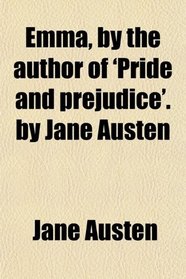Search -
Emma, by the author of 'Pride and prejudice'. by Jane Austen
Emma by the author of 'Pride and prejudice' by Jane Austen
Author:
Purchase of this book includes free trial access to www.million-books.com where you can read more than a million books for free. This is an OCR edition with typos. Excerpt from book: CHAPTER III. Mr. Woodhousb was fond of society in his own way. He liked very much to have his friends come and see him and from various united causes, from h... more »
Author:
Purchase of this book includes free trial access to www.million-books.com where you can read more than a million books for free. This is an OCR edition with typos. Excerpt from book: CHAPTER III. Mr. Woodhousb was fond of society in his own way. He liked very much to have his friends come and see him and from various united causes, from h... more »
ISBN-13: 9780217712750
ISBN-10: 0217712754
Publication Date: 8/16/2009
Pages: 308
Rating: 1
ISBN-10: 0217712754
Publication Date: 8/16/2009
Pages: 308
Rating: 1
3.5 stars, based on 1 rating




